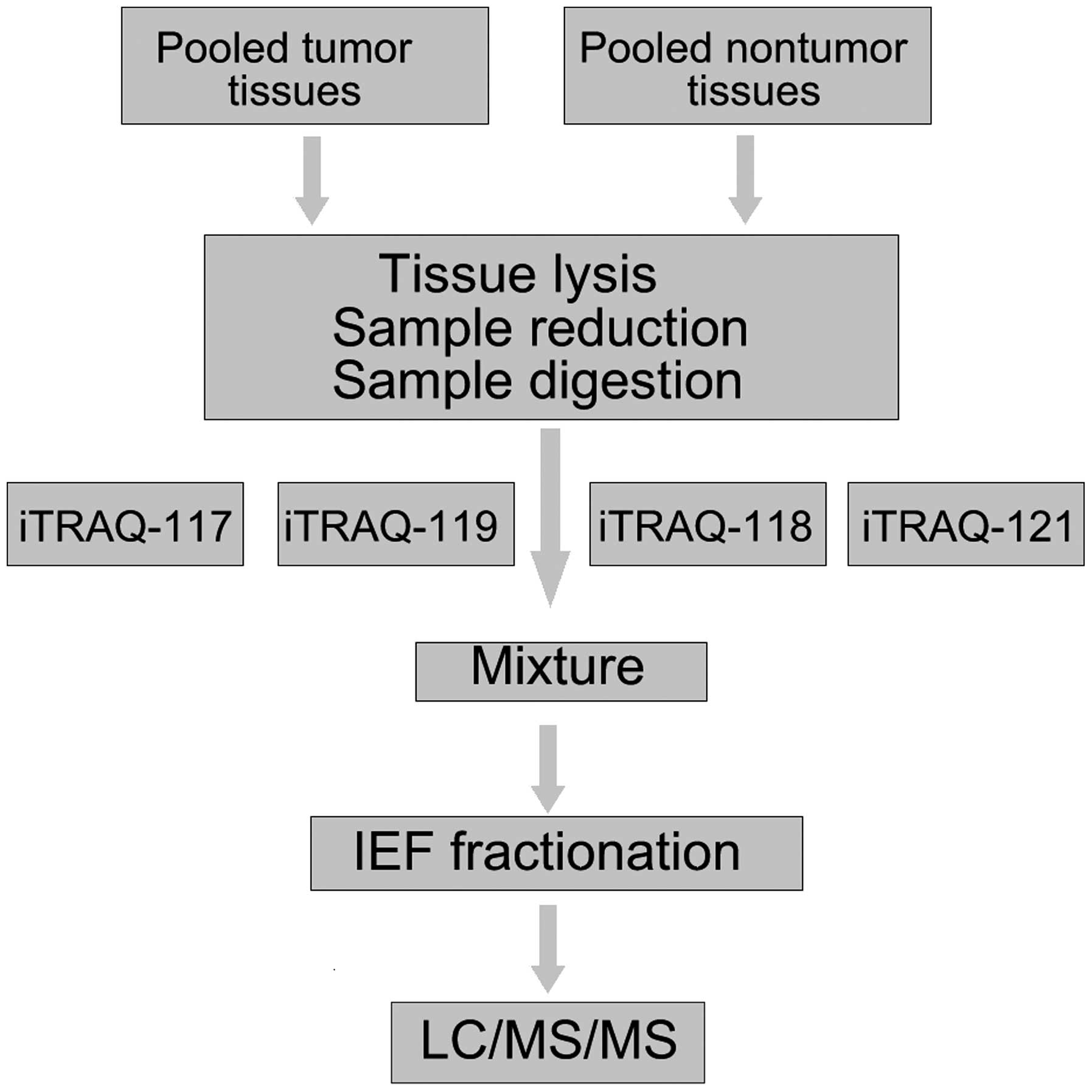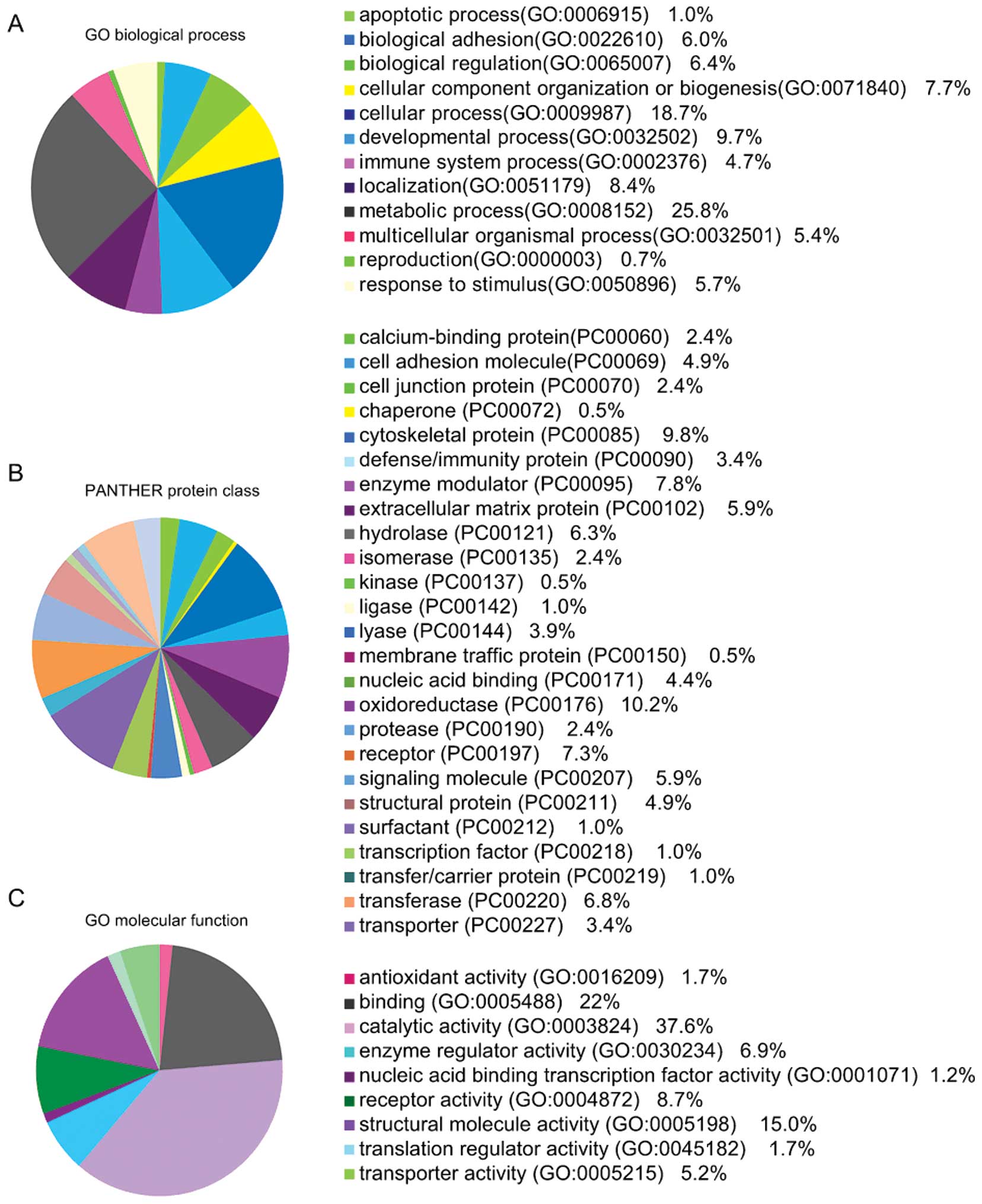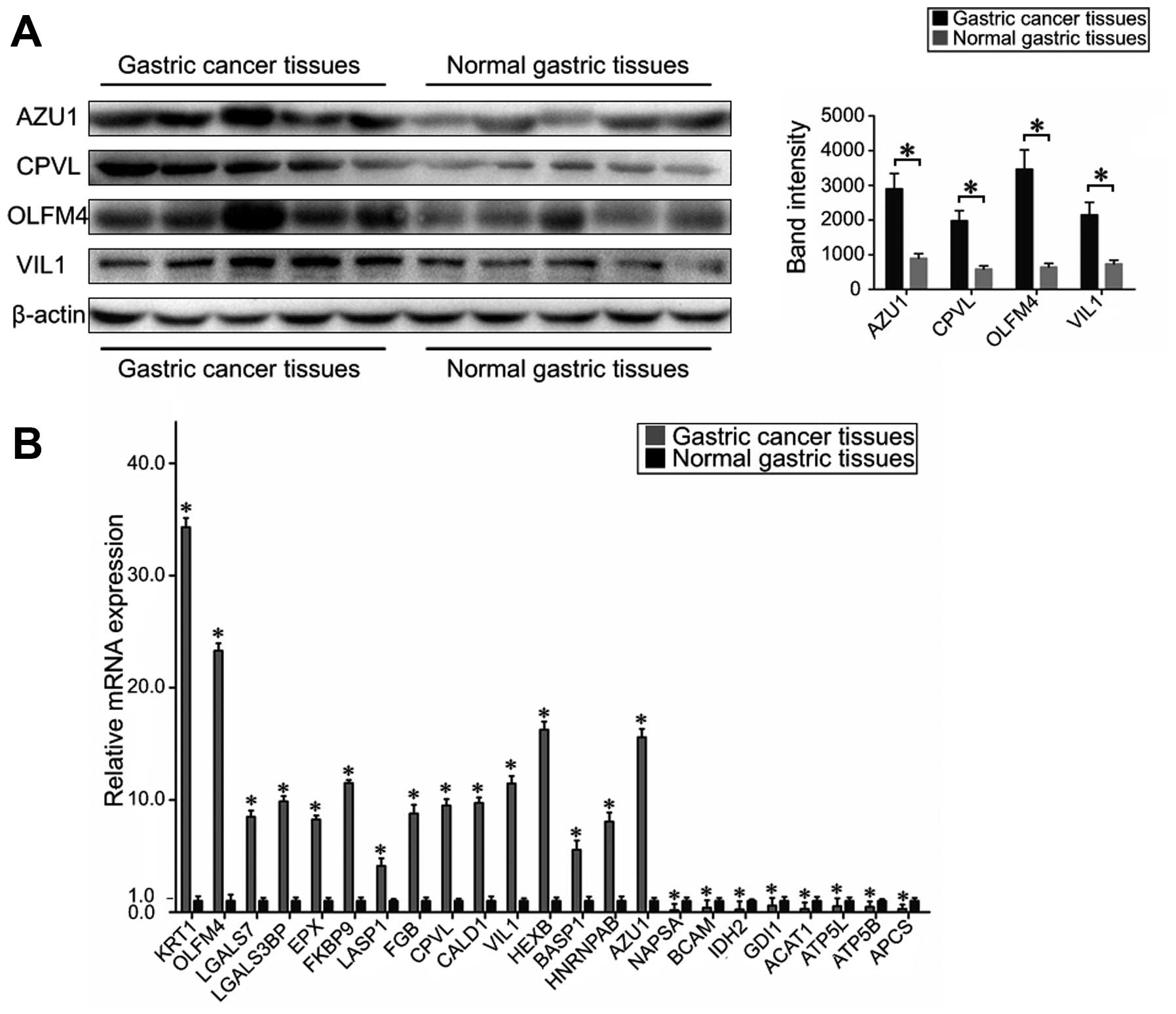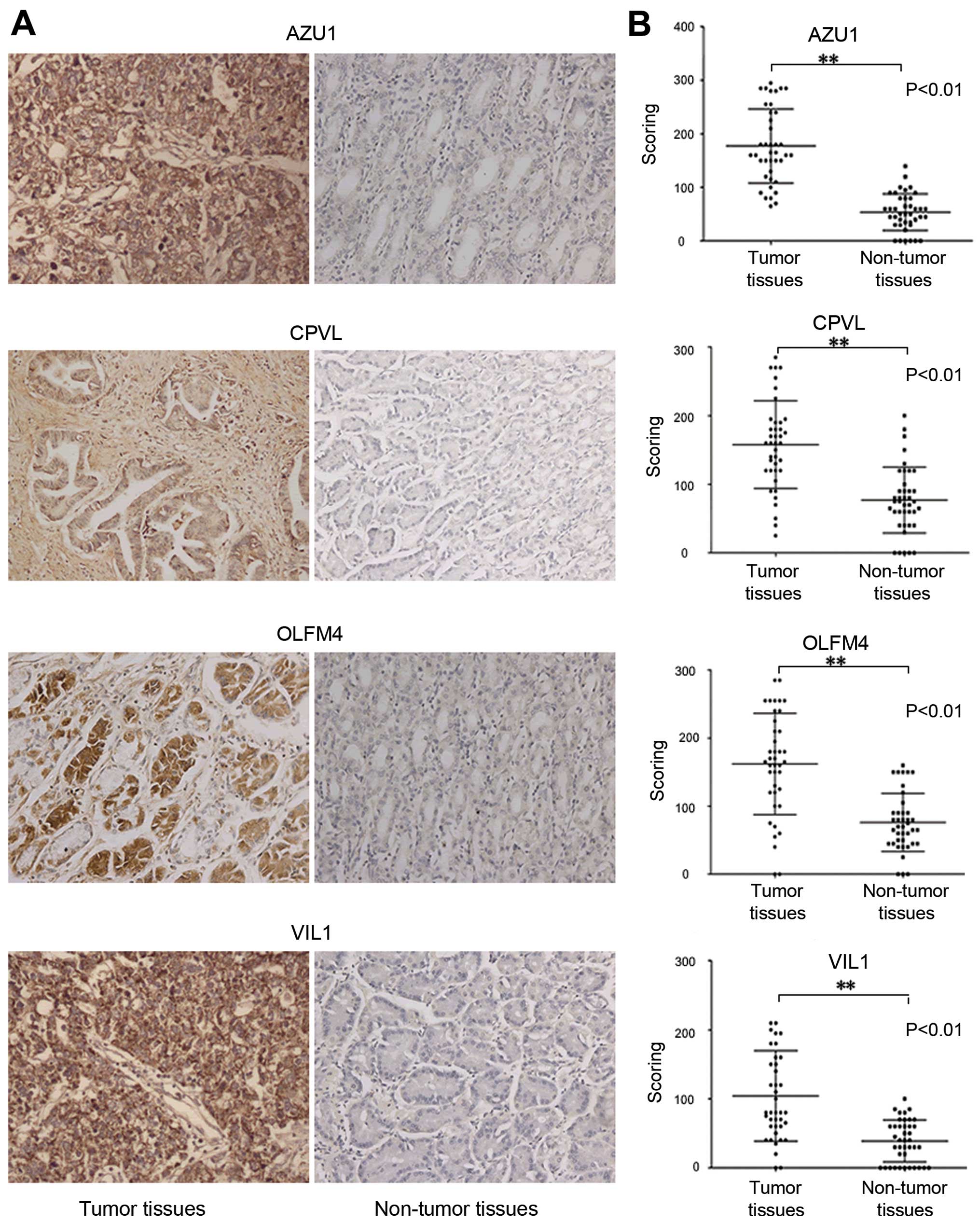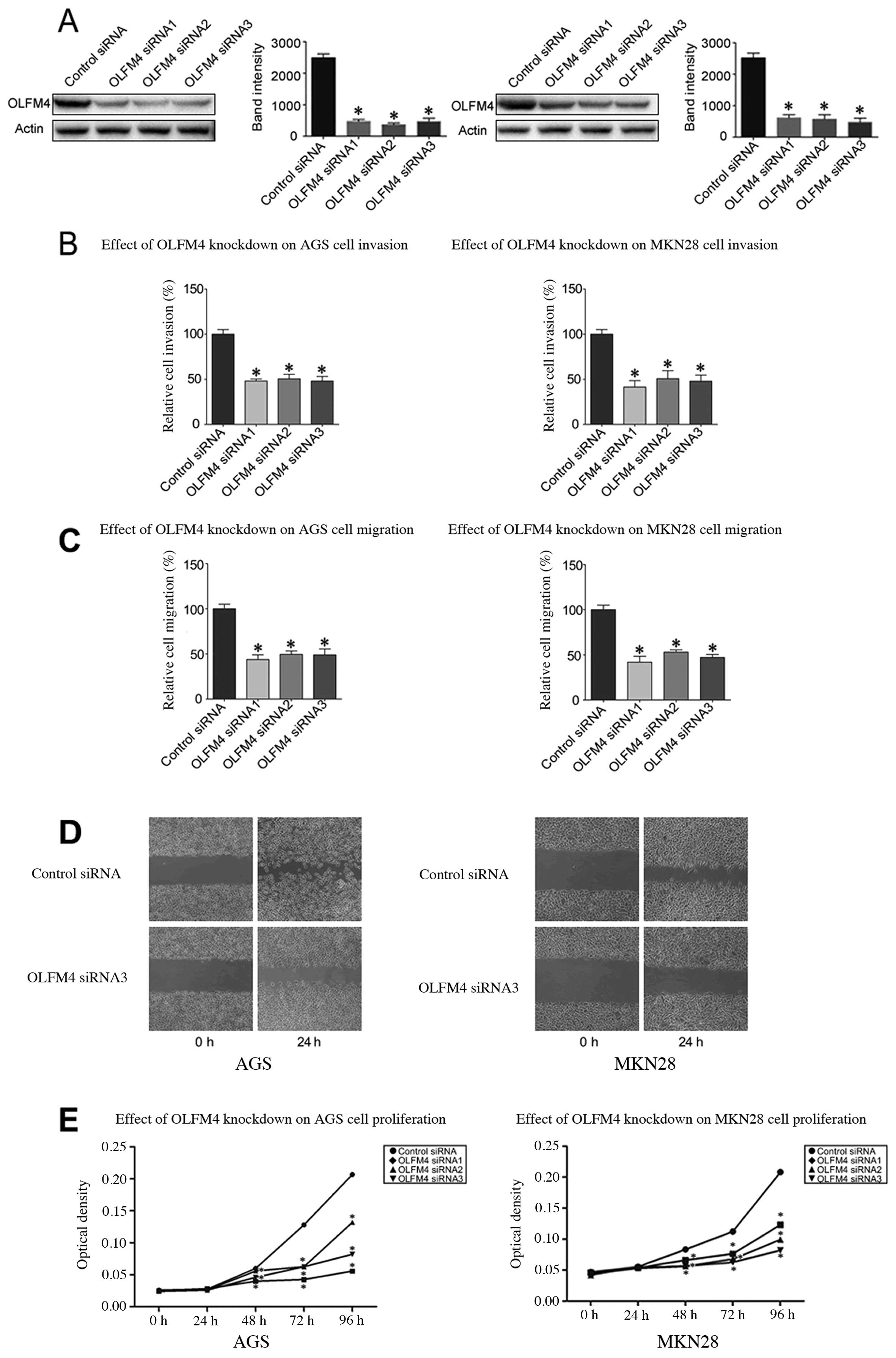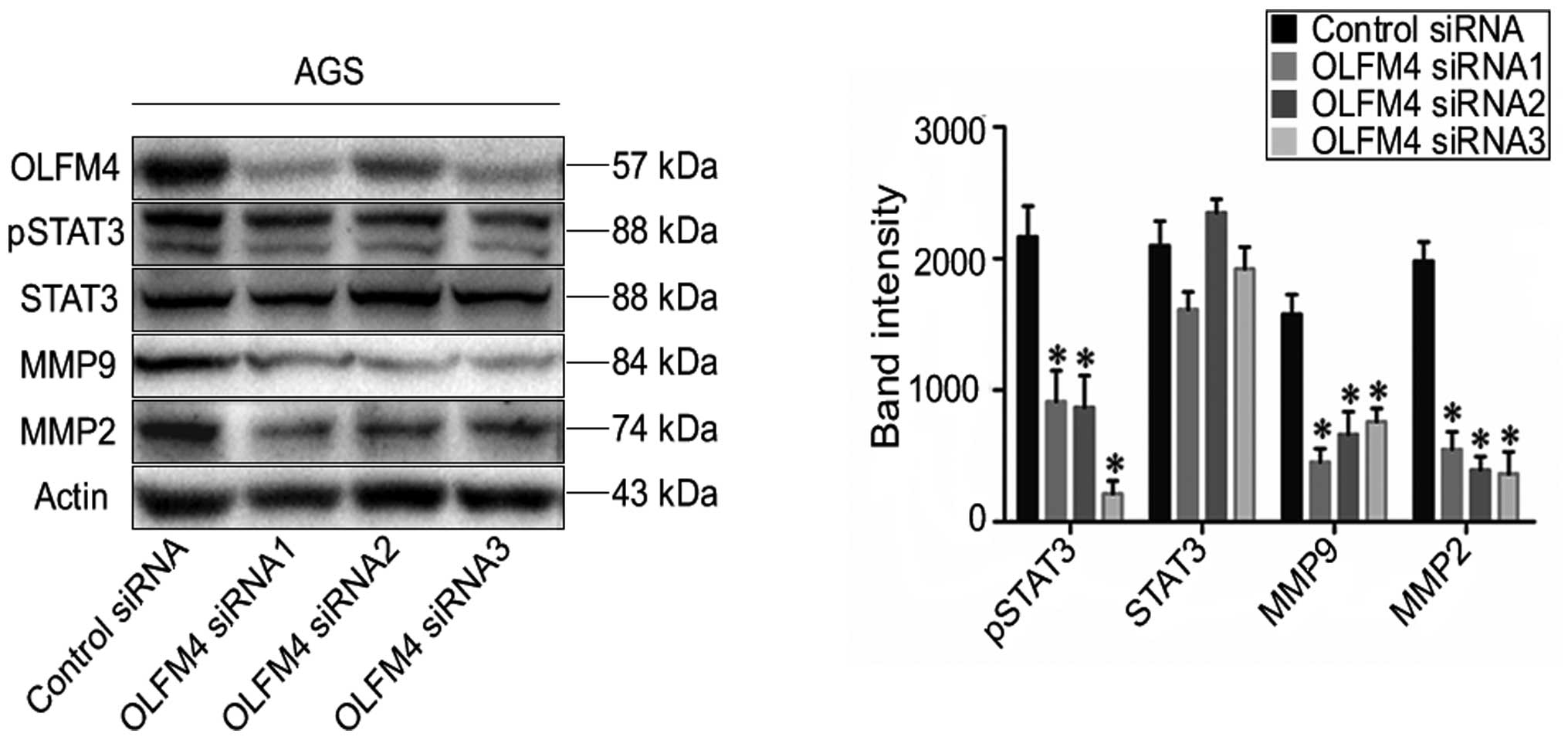|
1
|
Loomis D, Huang W and Chen G: The
International Agency for Research on Cancer (IARC) evaluation of
the carcinogenicity of outdoor air pollution: Focus on China. Chin
J Cancer. 33:189–196. 2014. View Article : Google Scholar : PubMed/NCBI
|
|
2
|
Takeno S, Noguchi T, Kikuchi R, Sato T,
Uchida Y and Yokoyama S: Analysis of the survival period in
resectable stage IV gastric cancer. Ann Surg Oncol. 8:215–221.
2001. View Article : Google Scholar : PubMed/NCBI
|
|
3
|
Klose J and Kobalz U: Two-dimensional
electrophoresis of proteins: An updated protocol and implications
for a functional analysis of the genome. Electrophoresis.
16:1034–1059. 1995. View Article : Google Scholar : PubMed/NCBI
|
|
4
|
Görg A, Obermaier C, Boguth G, Harder A,
Scheibe B, Wildgruber R and Weiss W: The current state of
two-dimensional electrophoresis with immobilized pH gradients.
Electrophoresis. 21:1037–1053. 2000. View Article : Google Scholar : PubMed/NCBI
|
|
5
|
Ross PL, Huang YN, Marchese JN, Williamson
B, Parker K, Hattan S, Khainovski N, Pillai S, Dey S, Daniels S, et
al: Multiplexed protein quantitation in Saccharomyces cerevisiae
using amine-reactive isobaric tagging reagents. Mol Cell
Proteomics. 3:1154–1169. 2004. View Article : Google Scholar : PubMed/NCBI
|
|
6
|
Gygi SP, Rist B, Gerber SA, Turecek F,
Gelb MH and Aebersold R: Quantitative analysis of complex protein
mixtures using isotope-coded affinity tags. Nat Biotechnol.
17:994–999. 1999. View
Article : Google Scholar : PubMed/NCBI
|
|
7
|
Mirgorodskaya OA, Kozmin YP, Titov MI,
Körner R, Sönksen CP and Roepstorff P: Quantitation of peptides and
proteins by matrix-assisted laser desorption/ionization mass
spectrometry using (18)O-labeled internal standards. Rapid Commun
Mass Spectrom. 14:1226–1232. 2000. View Article : Google Scholar : PubMed/NCBI
|
|
8
|
Ong SE, Blagoev B, Kratchmarova I,
Kristensen DB, Steen H, Pandey A and Mann M: Stable isotope
labeling by amino acids in cell culture, SILAC, as a simple and
accurate approach to expression proteomics. Mol Cell Proteomics.
1:376–386. 2002. View Article : Google Scholar : PubMed/NCBI
|
|
9
|
Wang LN, Tong SW, Hu HD, Ye F, Li SL, Ren
H, Zhang DZ, Xiang R and Yang YX: Quantitative proteome analysis of
ovarian cancer tissues using a iTRAQ approach. J Cell Biochem.
113:3762–3772. 2012. View Article : Google Scholar : PubMed/NCBI
|
|
10
|
Yang Y, Toy W, Choong LY, Hou P, Ashktorab
H, Smoot DT, Yeoh KG and Lim YP: Discovery of SLC3A2 cell membrane
protein as a potential gastric cancer biomarker: Implications in
molecular imaging. J Proteome Res. 11:5736–5747. 2012.PubMed/NCBI
|
|
11
|
Livak KJ and Schmittgen TD: Analysis of
relative gene expression data using real-time quantitative PCR and
the 2(−ΔΔC(T)) method. Methods. 25:402–408. 2001. View Article : Google Scholar
|
|
12
|
Ho J, Kong JW, Choong LY, Loh MC, Toy W,
Chong PK, Wong CH, Wong CY, Shah N and Lim YP: Novel breast cancer
metastasis-associated proteins. J Proteome Res. 8:583–594. 2009.
View Article : Google Scholar
|
|
13
|
Gan CS, Chong PK, Pham TK and Wright PC:
Technical, experimental, and biological variations in isobaric tags
for relative and absolute quantitation (iTRAQ). J Proteome Res.
6:821–827. 2007. View Article : Google Scholar : PubMed/NCBI
|
|
14
|
Chen Y, Choong LY, Lin Q, Philp R, Wong
CH, Ang BK, Tan YL, Loh MC, Hew CL, Shah N, et al: Differential
expression of novel tyrosine kinase substrates during breast cancer
development. Mol Cell Proteomics. 6:2072–2087. 2007. View Article : Google Scholar : PubMed/NCBI
|
|
15
|
Chong PK, Lee H, Zhou J, Liu SC, Loh MC,
So JB, Lim KH, Yeoh KG and Lim YP: Reduced plasma APOA1 level is
associated with gastric tumor growth in MKN45 mouse xenograft
model. J Proteomics. 73:1632–1640. 2010. View Article : Google Scholar : PubMed/NCBI
|
|
16
|
Pierce A, Unwin RD, Evans CA, Griffiths S,
Carney L, Zhang L, Jaworska E, Lee CF, Blinco D, Okoniewski MJ, et
al: Eight-channel iTRAQ enables comparison of the activity of six
leukemogenic tyrosine kinases. Mol Cell Proteomics. 7:853–863.
2008. View Article : Google Scholar
|
|
17
|
Zhou C, Simpson KL, Lancashire LJ, Walker
MJ, Dawson MJ, Unwin RD, Rembielak A, Price P, West C, Dive C, et
al: Statistical considerations of optimal study design for human
plasma proteomics and biomarker discovery. J Proteome Res.
11:2103–2113. 2012. View Article : Google Scholar : PubMed/NCBI
|
|
18
|
Chong PK, Lee H, Loh MC, Choong LY, Lin Q,
So JB, Lim KH, Soo RA, Yong WP, Chan SP, et al: Upregulation of
plasma C9 protein in gastric cancer patients. Proteomics.
10:3210–3221. 2010. View Article : Google Scholar : PubMed/NCBI
|
|
19
|
Lim S, Choong LY, Kuan CP, Yunhao C and
Lim YP: Regulation of macrophage inhibitory factor (MIF) by
epidermal growth factor receptor (EGFR) in the MCF10AT model of
breast cancer progression. J Proteome Res. 8:4062–4076. 2009.
View Article : Google Scholar : PubMed/NCBI
|
|
20
|
Yang Y, Lim SK, Choong LY, Lee H, Chen Y,
Chong PK, Ashktorab H, Wang TT, Salto-Tellez M, Yeoh KG, et al:
Cathepsin S mediates gastric cancer cell migration and invasion via
a putative network of metastasis-associated proteins. J Proteome
Res. 9:4767–4778. 2010. View Article : Google Scholar : PubMed/NCBI
|
|
21
|
Choong LY, Lim S, Chong PK, Wong CY, Shah
N and Lim YP: Proteome-wide profiling of the MCF10AT breast cancer
progression model. PLoS One. 5:e110302010. View Article : Google Scholar : PubMed/NCBI
|
|
22
|
Xie TX, Wei D, Liu M, Gao AC, Ali-Osman F,
Sawaya R and Huang S: Stat3 activation regulates the expression of
matrix metalloproteinase-2 and tumor invasion and metastasis.
Oncogene. 23:3550–3560. 2004. View Article : Google Scholar : PubMed/NCBI
|
|
23
|
Yu H, Pardoll D and Jove R: STATs in
cancer inflammation and immunity: A leading role for STAT3. Nat Rev
Cancer. 9:798–809. 2009. View
Article : Google Scholar : PubMed/NCBI
|
|
24
|
Huang Y, Yang M, Yang H and Zeng Z:
Upregulation of the GRIM-19 gene suppresses invasion and metastasis
of human gastric cancer SGC-7901 cell line. Exp Cell Res.
316:2061–2070. 2010. View Article : Google Scholar : PubMed/NCBI
|
|
25
|
Li C, Yan M, Chen J, Xiang M, Zhu ZG, Yin
HR and Lin YZ: Survival benefit of non-curative gastrectomy for
gastric cancer patients with synchronous distant metastasis. J
Gastrointest Surg. 14:282–288. 2010. View Article : Google Scholar
|
|
26
|
Yu L, Wang L and Chen S: Olfactomedin 4, a
novel marker for the differentiation and progression of
gastrointestinal cancers. Neoplasma. 58:9–13. 2011. View Article : Google Scholar
|
|
27
|
Zeng LC, Han ZG and Ma WJ: Elucidation of
subfamily segregation and intramolecular coevolution of the
olfactomedin-like proteins by comprehensive phylogenetic analysis
and gene expression pattern assessment. FEBS Lett. 579:5443–5453.
2005. View Article : Google Scholar : PubMed/NCBI
|
|
28
|
Tomarev SI and Nakaya N: Olfactomedin
domain-containing proteins: Possible mechanisms of action and
functions in normal development and pathology. Mol Neurobiol.
40:122–138. 2009. View Article : Google Scholar : PubMed/NCBI
|
|
29
|
Liu W, Zhu J, Cao L and Rodgers GP:
Expression of hGC-1 is correlated with differentiation of gastric
carcinoma. Histopathology. 51:157–165. 2007. View Article : Google Scholar : PubMed/NCBI
|
|
30
|
Besson D1, Pavageau AH, Valo I, Bourreau
A, Bélanger A, Eymerit-Morin C, Moulière A, Chassevent A,
Boisdron-Celle M, Morel A, et al: A quantitative proteomic approach
of the different stages of colorectal cancer establishes OLFM4 as a
new nonmetastatic tumor marker. Mol Cell Proteomics.
10:M111.0097122011. View Article : Google Scholar : PubMed/NCBI
|
|
31
|
Kobayashi D, Koshida S, Moriai R, Tsuji N
and Watanabe N: Olfactomedin 4 promotes S-phase transition in
proliferation of pancreatic cancer cells. Cancer Sci. 98:334–340.
2007. View Article : Google Scholar : PubMed/NCBI
|
|
32
|
Koshida S, Kobayashi D, Moriai R, Tsuji N
and Watanabe N: Specific overexpression of OLFM4(GW112/HGC-1) mRNA
in colon, breast and lung cancer tissues detected using
quantitative analysis. Cancer Sci. 98:315–320. 2007. View Article : Google Scholar : PubMed/NCBI
|
|
33
|
Marimuthu A, Chavan S, Sathe G,
Sahasrabuddhe NA, Srikanth SM, Renuse S, Ahmad S, Radhakrishnan A,
Barbhuiya MA, Kumar RV, et al: Identification of head and neck
squamous cell carcinoma biomarker candidates through proteomic
analysis of cancer cell secretome. Biochim Biophys Acta.
1834:2308–2316. 2013. View Article : Google Scholar : PubMed/NCBI
|
|
34
|
Zhang X, Huang Q, Yang Z, Li Y and Li CY:
GW112, a novel antiapoptotic protein that promotes tumor growth.
Cancer Res. 64:2474–2481. 2004. View Article : Google Scholar : PubMed/NCBI
|
|
35
|
Liu W, Chen L, Zhu J and Rodgers GP: The
glycoprotein hGC-1 binds to cadherin and lectins. Exp Cell Res.
312:1785–1797. 2006. View Article : Google Scholar : PubMed/NCBI
|
|
36
|
van der Flier LG, Haegebarth A, Stange DE,
van de Wetering M and Clevers H: OLFM4 is a robust marker for stem
cells in human intestine and marks a subset of colorectal cancer
cells. Gastroenterology. 137:15–17. 2009. View Article : Google Scholar : PubMed/NCBI
|
|
37
|
Yoon S, Woo SU, Kang JH, Kim K, Shin HJ,
Gwak HS, Park S and Chwae YJ: NF-κB and STAT3 cooperatively induce
IL6 in starved cancer cells. Oncogene. 31:3467–3481. 2012.
View Article : Google Scholar
|
|
38
|
Rousseau-Merck MF, Simon-Chazottes D,
Arpin M, Pringault E, Louvard D, Guénet JL and Berger R:
Localization of the villin gene on human chromosome 2q35-q36 and on
mouse chromosome 1. Hum Genet. 78:130–133. 1988. View Article : Google Scholar : PubMed/NCBI
|
|
39
|
Yokota E, Tominaga M, Mabuchi I, Tsuji Y,
Staiger CJ, Oiwa K and Shimmen T: Plant villin, lily P-135-ABP,
possesses G-actin binding activity and accelerates the
polymerization and depolymerization of actin in a
Ca2+-sensitive manner. Plant Cell Physiol. 46:1690–1703.
2005. View Article : Google Scholar : PubMed/NCBI
|
|
40
|
Osborn M, Mazzoleni G, Santini D, Marrano
D, Martinelli G and Weber K: Villin, intestinal brush border
hydrolases and keratin polypeptides in intestinal metaplasia and
gastric cancer; an immunohistologic study emphasizing the different
degrees of intestinal and gastric differentiation in signet ring
cell carcinomas. Virchows Arch A Pathol Anat Histopathol.
413:303–312. 1988. View Article : Google Scholar : PubMed/NCBI
|
|
41
|
Robine S, Huet C, Moll R,
Sahuquillo-Merino C, Coudrier E, Zweibaum A and Louvard D: Can
villin be used to identify malignant and undifferentiated normal
digestive epithelial cells? Proc Natl Acad Sci USA. 82:8488–8492.
1985. View Article : Google Scholar : PubMed/NCBI
|
|
42
|
Xieraili M, Yasen M, Mogushi K, Obulhasim
G, Mayinuer A, Aihara A, Tanaka S, Mizushima H, Tanaka H and Arii
S: Villin 1 is a predictive factor for the recurrence of high serum
alpha-fetoprotein-associated hepatocellular carcinoma after
hepatectomy. Cancer Sci. 103:1493–1501. 2012. View Article : Google Scholar : PubMed/NCBI
|
|
43
|
Pereira HA, Shafer WM, Pohl J, Martin LE
and Spitznagel JK: CAP37, a human neutrophil-derived chemotactic
factor with monocyte specific activity. J Clin Invest.
85:1468–1476. 1990. View Article : Google Scholar : PubMed/NCBI
|
|
44
|
Raff JW: Centrosomes and cancer: Lessons
from a TACC. Trends Cell Biol. 12:222–225. 2002. View Article : Google Scholar : PubMed/NCBI
|
|
45
|
Mahoney JA, Ntolosi B, DaSilva RP, Gordon
S and McKnight AJ: Cloning and characterization of CPVL, a novel
serine carboxypeptidase, from human macrophages. Genomics.
72:243–251. 2001. View Article : Google Scholar : PubMed/NCBI
|















